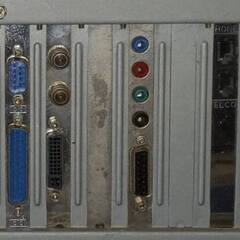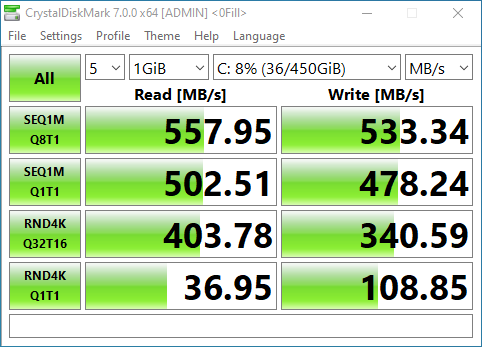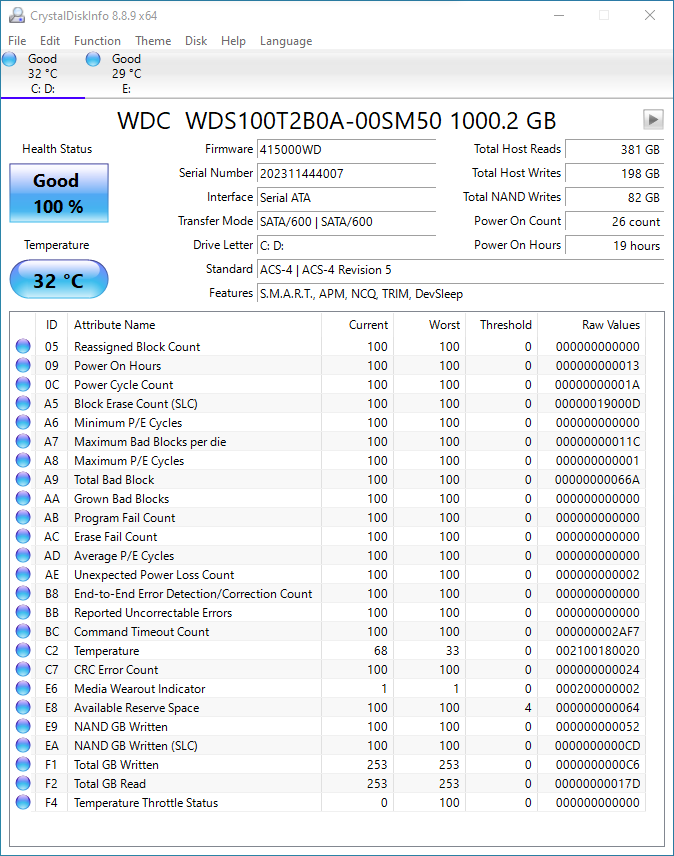-
Posts
8,210 -
Joined
-
Last visited
Awards
This user doesn't have any awards
About Nineshadow
- Birthday Jul 07, 1999
Contact Methods
-
Steam
Nineshadow
Profile Information
-
Gender
Male
-
Location
A disco somewhere in Romania
-
Interests
Anything related to technology
-
Occupation
Student
-
Member title
Hypno Disco Ball?
System
-
CPU
i5 4670k
-
Motherboard
ASrock z87 EXTREME4
-
RAM
Kingston HyperX Beast 8GB DDR3 RAM @ 2133GHz 9CL
-
GPU
Asus DirectCU GTX 560(going to upgrade later)
-
Case
Corsair Carbide 200R
-
Storage
Seagate Barracuda 1TB
-
PSU
Super Flower Golden King 550W(Platinum)
-
Display(s)
some Samsung1680x1050 monitor(TN)
-
Cooling
CoolerMaster Hyper 212 Evo
-
Keyboard
Microsoft Sidewinder x4
-
Mouse
Hama uRage Evo
-
Sound
AudioTechnica ATH M30x
-
Operating System
Windows 10/Arch Linux
Nineshadow's Achievements
-

5500xt black screen crash, fans spinning at full speed
Nineshadow replied to Nineshadow's topic in Troubleshooting
An update: I sent back the 5500xt and got a refund. Today I found a used RX580 nearby, I went and tested it and it was ok. Now I'm home and it's been running furmark for 30 minutes and it's stable. The issue was the other GPU. The box that it came in had a small puncture and it probably slightly damaged something on the card. -

5500xt black screen crash, fans spinning at full speed
Nineshadow replied to Nineshadow's topic in Troubleshooting
I've also noticed the fans make a weird sound around 2200RPM: -

5500xt black screen crash, fans spinning at full speed
Nineshadow replied to Nineshadow's topic in Troubleshooting
Wattman is AMD's utility for tweaking the gpu parameters (clock speed, voltage, etc). After a crash it's pretty normal to reload the default settings. -

5500xt black screen crash, fans spinning at full speed
Nineshadow replied to Nineshadow's topic in Troubleshooting
I tried to see if things are any different on Linux, since I had a clean install there. 10 minutes into Furmark, same black screen crash, with the fans on maximum. -

5500xt black screen crash, fans spinning at full speed
Nineshadow replied to Nineshadow's topic in Troubleshooting
Did that. Now I'm not getting the same black screen hard crash anymore. Cyberpunk just crashed and I got sent to the desktop. The AMD drivers detected a driver timeout. Edit: nevermind, just got another black screen crash I -also don't think temps are an issue. GPU temp is around 60C and junction temp is around 70C. -

5500xt black screen crash, fans spinning at full speed
Nineshadow replied to Nineshadow's topic in Troubleshooting
I've just bought it and I can return it in the next week. The problem is that there is nothing else to buy. It doesn't make sense for it to be the psu since my old 560 sucked up more power. As of now it's been running MSI Kombustor for 30 minutes without any issues. -

5500xt black screen crash, fans spinning at full speed
Nineshadow replied to Nineshadow's topic in Troubleshooting
I've been running MSI Kombustor for a while and it wasn't crashing. I kept thinking it might be the PSU and I decided to also run Prime95 and it crashed in like 5 minutes. -
Hello everyone. I've recently bought a new 5500xt as a replacement for my aging gtx 560. When playing Cyberpunk, after 10-15 minutes, the screen goes black, the GPU fans start spinning at full speed and the system becomes unresponsive. I have to power off the pc and turn it on again. I've stress tested the GPU with superposition and unigine valley for 2 hours and I've had no crashes. I've also played Star Wars Jedi Fallen Order for an hour without any issues. Right now I'm thinking of a few options: - nvidia old drivers were not uninstalled properly - psu issues - amd drivers - cyberpunk just being trash
-

Function in C - Why "malloc( )" required for creating char *
Nineshadow replied to 3.14159's topic in Programming
Yes, the reason it doesn't work is because in C an array (eg. int v[]) is almost the same as a pointer (int *p), but the array is allocated on the stack and not on the heap. When you declare a vector int v[] = {0, 1, 2, 3, 4}, v is a pointer to the location in memory where the beginning of the array is found. You can view the exact memory location if you do something like printf("%p\n", v). To be exact, the only difference you will see between a declaration like int *v or int v[] is that int *v sizeof returns 4/8 bytes (the size of a memory address, 4 bytes for a 32 bit architecture and 8 bytes for 64 bits), while sizeof for int v[] returns the entire bytes occupied by the array (for an int v[4], that would be 4 int-s of 4 bytes each so 16 byes) An array such as int v[] is allocated on the stack. You can think of it as if each function call has its own stack portion and all local variables belong on the local portion of the stack. When you declare a variable such as int x inside a function foo, it's allocated on the local stack of the function f. It is not visible outside the function, eg. you can't access the variable x in another function g. Malloc is a way of doing dynamic allocation in C, meaning that you allocate memory on the heap and not on the stack. That way, you can pass results from one function to another by returning pointers to variables in memory that doesn't go out of scope when the function ends. What happens in your code if you allocate statically (on the stack), is that after your function ends, its variables on the stack are sometimes replaced by other variables of other functions. Sometimes it doesn't, and the function works, but it's not something you can count on. If you need more info I would be glad to help. -

NVIDIA to reintroduce the RTX 2060 series into the market
Nineshadow replied to Nineshadow's topic in Tech News
Quick update: Today I've seen a local retailer restock the RTX 2060. Unsurpisingly, it's quite expensive: (roughly 600 EUR) -
It depends on the execution. I didn't read all the specifics of the patent exactly. Another somewhat similar examples are QLC SSDs. QLC store 4 bits of information per cell and is much slower. Most drives offer an SLC cache for decent performance. Are QLC SSDs bad? Not necessarily, they provide a larger storage space at a really low price.
-
You coud probably make a context free language for some simpler situations. Eg: ADD(+x, offset) is something like: >offset +x <offset (assuming positive offset, it's reversed for a negative offset) However, it doesn't cover situations where you have inter-weaved + and - eg. +---++--+++--+-+-+- Generally, it should be something like: ADD(x, offset) >offset w <offset , where the number of "+" in w minus the number of "-" in w is equal to x That's pretty complicated and kinda useless (why would you do ++++--- instead of just +?). Still, you could contract addition and subtraction. Instead of incrementing/decrementing by 1 at a time, just add/subtract the exact value needed +++--+-+--+ is equivalent to adding 1. That would make your job easier and it would be a pretty nice optimization. [-] should cell a cell to 0 immediately and you can recognize it easily. ZERO(offset) would just be >offset ZERO(0) <offset For jumps I suggest making a jump table. Eg. precomputing where a loop will and and where you should go back at the end of the loop.
-
I've had a 200R for some years now and didn't think to remove the front fan to see if it makes any difference. I will try to do it and observe the results. I have one issue though. A few months ago I moved my PC and I now get a weird, but faint sound coming out of the case. It's annoying and I don't really know where it's coming from. Usually a bang in the side panel fixes it. I think it's either the front fan, the side panel, or the drive cage.
-
Summary Among the GPU shortages of these days, NVIDIA has plans to reintroduce more RTX 2060 and 2060 Super cards into the market, even though the 3060 is planned to be released next month. The prices are expected to hover around 300 EUR for an RTX 2060 and around 400 EUR for an RTX 2060 Super (in France). Quotes My thoughts I've wanted to upgrade my GPU for quite a while now, but I, like a lot of other people out there, don't want to spend a big amount of money on a GPU. Right now, most mainstream video cards, such as the 1660 super or the RTX 2060, are either out of stock everywhere, or sold by scalpers at insane prices. The only cards that I see available are 600+ Euros and that leaves a lot of budget gamers with no GPU options. This news brings some hope of finding a decent GPU at a reasonable price. However, it remains to be seen if it will be effective. The new GPU stock could be gone really quickly, or it could be sold at inflated prices. On the other hand, this also hints at issues with the RTX 3060. NVIDIA might not be able to release it on time (unlikely), or NVIDIA has issues with supply and their partners won't be able to sell them at launch price (likely). Considering the new stock of RTX 2060 Super is expected to cost more than the MSRP of the RTX 3060, I think it's the latter. Sources overclocking.com [french] videocardz.com
-
So it seems a SATA 3 port on my motherboard is somewhat broken and that's why the SSD showed up as SATA 2 (with Intel Rapid Storage). I plugged it into another port and it works fine now



















.png)

